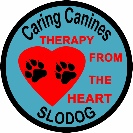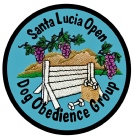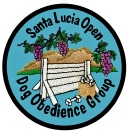

Caring Canines Purpose
The purpose of the SLODOG Caring Canines program is to bring trained therapy dog teams directly to individuals residing in local care facilities, participate with Reading 2 Rover programs, and College Outreach programs in San Luis Obispo County.
Caring Canines Teams (CCTs) bring a friendly smile and well trained dog to extended care facilities and assisted living communities. The residents of local care facilities look forward to the arrival of the CCTs and for many, the visits are the highlight of their week.
Reading to Rover Programs provides a relaxed and “dog-friendly” atmosphere, which allows students to practice the skill of reading. Many of the children chosen for this program have difficulties reading and as a result have developed self-esteem issues. CCTs participating in R2R complete additional training and testing, prior to working with children.
College Outreach Programs bring students and therapy dog teams together. Visits normally take place during “dead week” and provide a respite from the stress of studying for finals. Additionally, CCTs help ease homesickness for students being away from pets and family members.
Should I Become a Caring Canines Team Member?
Is My Dog a Good Therapy Dog Candidate?
CARING CANINES
Should I Become a Caring Canines Team Member?
Volunteers are an important part of any group and Caring Canines Teams serve a very important role in the SLODOG community, but not every dog is suited for the role. Please consider the following questions to help decide if being a therapy dog volunteer is the right fit for you:
Are you friendly with other people and their pets?
Do you enjoy interacting with people of all ages?
Are you in “tune” with the emotional needs of your dog?
Are you comfortable in a nursing home or medical setting?
Do you have the time and energy to volunteer on a regular basis?
Has your dog been exposed to multiple social settings with different groups of people?
Do you have the time to continually train and update your dog's skill level?
Are you able to maintain your dog's appearance as required for all therapy visits?
Are you willing to keep your dog's vet records and shots up-to-date?
Do you have the desire to interact with children and/or adults? (Realize that the people you come in contact with may be in poor health, or need special assistance).
Is My Dog a Good Therapy Dog Candidate?
Please be critical and realistic when assessing your dog’s aptitude to be a Therapy Dog. Its hard work and requires a personal commitment. Additionally, we can’t stress the importance of ongoing training for Therapy Dogs.
Is your dog friendly and accepting of strangers?
Does your dog get along with dogs of all sizes and breeds?
Is your dog calm, able to sit on command, and stay for a long period of time?
Is your dog comfortable around adults and children? Or prefers one to the other?
Is your dog able to walk calmly through a crowd?
Is your dog able to stay focused even with distractions?
Does your dog enjoy being groomed or petted by a stranger?
Is your dog confident and carefree?
Is your dog relaxed even with loud, disruptive noises?
Does your dog have good manners even when you're not in the room?
Is your dog comfortable in a new, or changing, environment?
Certification Process
Take the Test: Be a Certified Therapy Dog
SLODOG CC requires that every dog certified as a Caring Canines Team therapy dog pass a challenging obedience and temperament evaluation.
Part One: AKC Canine Good Citizen Test
We use the nationally-recognized AKC Canine Good Citizen test (commonly referred to as the CGC) as our basic obedience testing standard. This test is administered by a Certified AKC CGC Evaluator. Every dog is required to pass the CGC before they can work in our programs. According to the AKC, your dog is eligible to take the CGC evaluation at any age; however, if your dog receives his/her CGC Certificate prior to turning one year old (12 months of age) you MUST retake the CGC exam as part of SLODOG therapy dog certification process. If it has been longer than 24 months since your dog was certified with the CGC, you will be required to retake and pass the CGC prior to your Therapy Dog evaluation. While SLODOG CC is not a breed-specific certifying organization, meaning we welcome all dog breeds we cannot for liability reasons accept wolf or wolf-hybrids into the program.
To learn more about the AKC Canine Good Citizen test requirements, visit the AKC online at: www.akc.org/events/cgc/training_testing.cfm
Part Two: SLODOG CC Application
Complete the application and submit it to the CC Chair. Once the application and CGC are turned in, you can then schedule the SLODOG evaluation.
Part Three: SLODOG CC Evaluation
After your dog successfully passes the Canine Good Citizen test - your dog must also pass the SLODOG CC Evaluation. This test ensures that your dog is able to remain calm in difficult, distracting and stressful situations, and work in a group with other dogs. You can expect your dog to be exposed to a variety of distractions (often referred to as 'sights and sounds') that a canine volunteer would find 'out in the field.' Some of those distractions include a wheelchair, walker, wheelchair alarm, medical equipment, food bits, multiple children, and other dogs.
The Final Step
Once you and your dog have completed these steps you are ready to begin attending CC-sponsored events as a team-in-training. A new therapy dog handler will be required to complete ten mentored visits with his or her dog to achieve fully certified Caring Canine Team status.
You can download and read the SLODOG, Caring Canines Workbook to learn more about this special program. Also included is the SLODOG CC Application and Evaluation form. Please contact Ginny Randall, SLODOG Caring Canine Chare for additional information.

